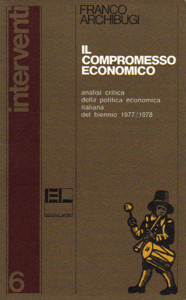|
 |
The economic compromise:
Critical analysis of the Italian economic policy (1977 / 78)
Second edition
[only available in Italian Edition]
by Franco Archibugi
Edizione Lavoro-1979
|
We are in 1977-78. In Italy. The experience of economic programming pressed by a group of socialist economists in a government made up of a coalition between Socialists and Christian Democrats has been failed. The economic programming – according to the author – constituted the hope of introducing a system of choices, negotiated among the government and social partners, in order to make their impact on reality more incisive; in other terms, choices which corresponded to an effective economic governance. In fact, according to the author’s opinion the traditional ‘economic policy’, essentially of ‘macro-economic’ type, with its absolutely generic and formal objectives (employment, output, public deficit, external commerce, liquidity, official discount rate, etc.) is nothing else than a folding screen hiding the practical incapacity of governments to have an impact on the economic trends, except that of favouring the choices of a big businesses, which in good and in bad times only succeed in obtaining what is at their advantage. After the failure of the economic programming, which required much deeper instruments of analysis regarding to the phenomena of production and distribution of incomes and of other satisfaction levels of the social preference, and which postulated a cognitive capacity of the disaggregate phenomena which the macro-economic policy was incapable of perceiving, and not even demanded, closed in its insignificant paradigms, we registered a ‘technical methodological’ reflux, favoured by a Communist Party and a union in ‘debacle’, and by an apparent ‘sceneggiata’ between so-called ‘Right’ and ‘Left’, both very conservative: a sceneggiata which has been named ‘economic compromise’ and re-established criteria and values of the traditional, always obsolete and useless ‘economic policy’, this time with the acquiescent guarantee of the Left political forces searching credits in order to hide away their own heavy ‘skeletons in their communist cupboards’, already falling into decay (but without any courage denounced on behalf of the Left wing itself).
This book is a pamphlet which represents the author’s last attempt (published by a slightly ‘independent’ publishing house) to denounce the hypocrisy, the ignorance and the mistakes, even if made in good faith, concerning the ‘economic compromise’; and the privileged interlocutors at the epoch were the unionists and the intellectuals that were not part of the nomenclatures (among which the power was fishing for new forces in order to consolidate its bureaucratic apparatus).
The booklet had two editions within a few months, but one poorly received by those from which some good orientations could have been drawn.
|